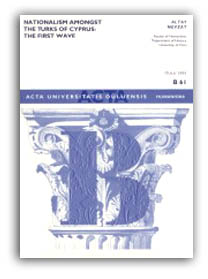|
|
 |
 |
| |
 September Review
/ Eylül Kitabı - 2006
September Review
/ Eylül Kitabı - 2006 |
| |
Altay Nevzat,
(2005), "Nationalism
Amongst the Turks of Cyprus: The First Wave ",
Oulun Yliopisto, Oulu, Finland, 2005, ISBN: 9514277503, pp.467, p/b
* [Academic
Dissertation to be presented with the assent of the Faculty of
Humanities, University of Oulu, for public discussion
in Kuusamonsali
(Auditorium YB210), Linnanmaa, on August 16th, 2005, at 12
noon
] |
| |
|
|
|
 The
rise of competing nationalisms in Cyprus first drew world attention in the
1950's, yet the origins of nationalism in Cyprus can clearly be traced to the
closing stages of Ottoman rule on the island during the nineteenth century.
While the earlier development of nationalism in the Greek Orthodox community of
Cyprus is commonly acknowledged, the pre-World War II evolution of nationalism
amongst Cyprus' Moslem Turks is consistently overlooked or misrepresented. The
rise of competing nationalisms in Cyprus first drew world attention in the
1950's, yet the origins of nationalism in Cyprus can clearly be traced to the
closing stages of Ottoman rule on the island during the nineteenth century.
While the earlier development of nationalism in the Greek Orthodox community of
Cyprus is commonly acknowledged, the pre-World War II evolution of nationalism
amongst Cyprus' Moslem Turks is consistently overlooked or misrepresented.
Contrary to
the conventional wisdom, this work contends that Turkish nationalism in Cyprus
did not first emerge in the 1950's, but instead grew gradually from the late
nineteenth century onwards; that nationalism amongst the island's Turks was
first discernible in a 'civic' form founded on Ottomanism which was gradually,
though progressively replaced by Turkish ethno-nationalism; and that while both
British colonial policies and especially the threat perceived from the rise of
Greek nationalism on the island may have helped spur nationalism amongst the
Turks, the continued cultural and political interaction with Ottoman, and even
non-Ottoman Turks, and later with the Turkish Republic was at least as
influential in fostering nationalist sentiments and prompting their expression
in political actions.
While
particular note is made of the often neglected impact of the Young Turk movement
in the early twentieth century, this study acknowledges and seeks to elucidate a
complex assortment of variegated stimuli that ranged from international
developments, such as the recurring crises in the Balkans and President Wilson's
speech on the 'Fourteen Points', to the personal attitudes and attributes of
British administrators and domestic inter-ethnic relations, and local and
international economic trends and developments. Together, it is maintained,
these influences had made Turkish nationalism a perceptible phenomenon amongst
the Turks of Cyprus by the time of the October Revolt of 1931. |
|
|
|
|
|
|
| |
|
| |
|
| |
Arts
& Culture
|
| |
|
|
 |
|









